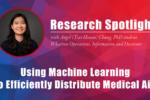Generative AI has the potential to revolutionize healthcare, enhancing diagnostics and enabling more personalized patient care. However, experts at the recent Penn LDI AI in Health Care Conference highlighted significant ethical and practical challenges, including the need for transparency, fairness, and regulation in clinical AI applications. Hamsa Bastani, Faculty Co-Lead of the Wharton Healthcare Analytics Lab, emphasized rigorous testing to reduce bias and ensure AI-driven tools truly improve patient outcomes.…Read More
Wharton Healthcare Analytics Lab
How to Improve AI Fairness in an Unfair World

Hamsa Bastani, Faculty Co-Lead at the Wharton Healthcare Analytics Lab, is co-author of a recent research paper, Rethinking Fairness for Human-AI Collaboration, with Haosen Ge, Data Scientist, Analytics at Wharton and Osbert Bastani, assistant professor in the Department of Computer and Information Science at the University of Pennsylvania.…Read More
Research Spotlight: Angel Chung

This month, we spoke with Angel (Tsai-Hsuan) Chung, a second-year PhD student in Wharton’s Operations, Information and Decisions (OID) Department, about her work in Sierra Leone on optimizing health supply chains with decision-aware machine learning…Read More
New Wharton Healthcare Analytics Lab is bridging the fields of healthcare and data science

(Outlet: The Daily Pennsylvanian) On Oct. 23, Analytics at Wharton announced the launch of the Wharton Healthcare Analytics Lab, which will be led by Hamsa Bastani, Associate Professor of Operations, Information, and Decisions, and Marissa King, the Alice Y. Hung President’s Distinguished Professor of Health Care.…Read More


